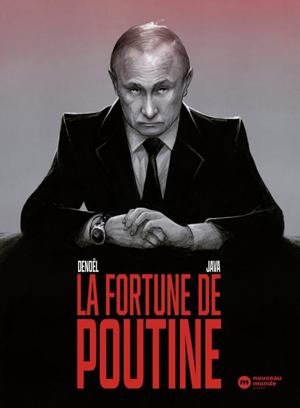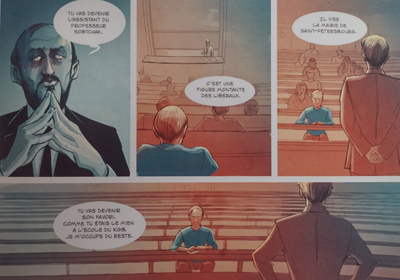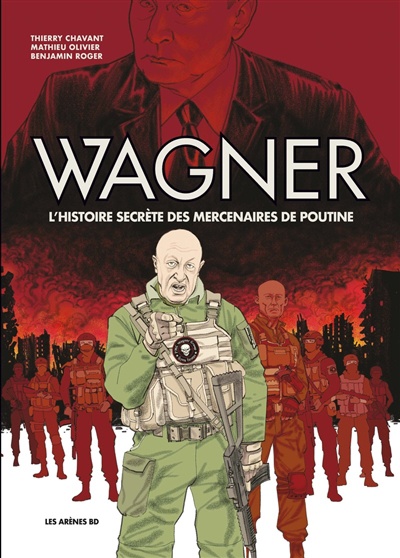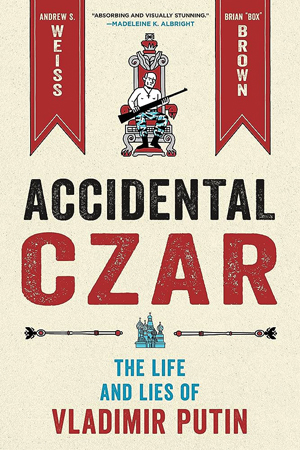
This graphic novel in French on Putin’s fortune recounts the events surrounding Vladimir Putin‘s rise to power and the establishment of his personal fortune. The latter is built through the exfiltration of colossal sums belonging to the Russian people, which are redirected to shell companies and tax havens.
As the story spans several decades, the reader becomes familiar with a multitude of company names and key political and economic figures.
As in the case of other major powers, there are also political and economic wheeling and dealing.
Russia’s power structure differs from that of the West. Relationships with the president play a much more important role than in the West. Benefits are granted in exchange for unwavering loyalty. The links between Silvio Berlusconi and Putin are just one example.
The scale of outflows of money from Russia for discreet purposes is astonishing. To cite just one example, the author notes the creation of Operation Luch (a capital flight estimated at $50 billion) in 1990 to counter the changes brought about by Gorbachev. This involved dipping into secret KGB funds abroad to enrich a fund that could be used to ensure the survival of the party and other vested interests.
“Since Putin came to power, the total amount of dirty money taken out of Russia and laundered through Western banks has been at least $1,000,000,000 (one thousand billion dollars)!
So, the West’s hands are not clean when it comes to what’s going on in Russia. When there’s quick money to be made and shareholders expect an unreasonable balance sheet, virtue takes a back seat to practicality. European accomplices include Danske Bank (Denmark), SEB and Swedbank (Sweden), Crédit Suisse, Banca Intesa (Italy), Deutsche Bank Russia, Appleby-Estera (offshore services firm), Cyprus (financial services firms), Price Waterhouse Coopers.
The reader also notes the accumulation of suicides by all kinds of officials over the years. For example, the author notes the disguised suicides of Nikolai Kruchina, Georgy Pavlov and Dimitri Lissovolik. These men, with their precarious balance, all had the annoying habit of taking the air on a balcony too high for their capacity. The KGB doubted the reliability of these men, who managed the party’s secret funds in the West.
Poisoning (with the poison Novitchok) is also a favored method for ironing out political differences. But this state of affairs is already well known to Westerners, as most failed or successful operations are the subject of numerous articles in the media. For example, this was the case for Navalny and Skripal. For Yushchenko, the winner of the Ukrainian presidential elections, dioxin was used but the source was not confirmed.
Under Putin, the oligarchs can keep the fortunes acquired through the many privatizations, but there is no longer any question of them interfering in political affairs. The book also looks at the deteriorating relationship between Putin and oligarchs such as Berezovsky (found hanged in his London bathroom) and Khodorkovsky.
If a devoted collaborator changes sides, at best he can survive by leaving the country and remaining apolitical. Otherwise, his plane may explode in flight, as in the case of Prigozhin.
The book shows how Ivan Rybkyn, a political opponent of Putin’s in 2004, withdrew after an impromptu van ride. It seems that he was seized and forced into the vehicle. This experience and the likely discussions that took place during the ride were enough to convince the candidate that he wasn’t really cut out for politics.

In the 90s, the Tambov mafia clan protected Putin and Sobchak and helped run the port of St. Petersburg. This did not prevent a “road accident” involving Vladimir Putin’s daughters and wife. Those dissatisfied with their share of the cake raised the stakes, and Putin had to bring the families together to work things out between them. Pragmatically, he sent his daughters to Germany for their safety. The legal guardian was Matthias Warnig, a former STASI officer.
The author points out that Russian money was used to influence the Brexit result (51.89%), this with the aim of weakening Europe. Then, as we already know, Russia influenced the voting result in key US states to help elect Donald Trump.
The graphic novel ends with a documentary dossier, with photos, drawings and references for those who want more information.
What about Putin’s fortune? According to the authors’ research, it’s between 150 and 250 billion euros.
Click on the link for more graphic novels and comics on my blog.
Title: La fortune de Poutine (Putin’s fortune)
Authors: Yvonnick Denoël and Gildas Java
Publisher: Nouveau monde graphic, © 2024
ISBN : 978-2-38094-501-0

